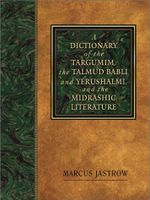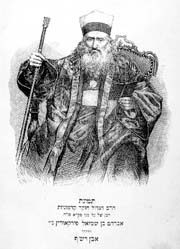
Interesting.
"But if the approach which seems to us peshuto shel mikra contradicts and opposes the received derashah which is transmitted to us by Chazal, such that it is impossible that both can be correct, for the contradictory is precluded, then it is incumbent upon us to go in the way of derash, and to translate the text according to it, because we only have the traditions of our Sages z"l, and in their light we can see light."
the Russian Foreign Ministry has until now ignored requests for an explanation of the interrogation. Political officials in Israel said Monday they think "the Kremlin expects gestures from Israel in exchange for the elimination of the affair."

There is no English-speaking yeshiva that does not have a Jastrow dictionary as a research tool in its bookshelves --- and a well-used one at that. The necessity for having a work that would make the Talmud more accessible to the English-speaking student has empowered the success of the Jastrow dictionary. Even those purists of Talmud studies who frown upon the use of the excellently translated volumes of the Talmud into English itself, raise no objection to the presence of Jastrow's dictionary within the walls of the study hall.This is interesting, expecially because in the yeshiva world great lengths are gone to make sure everyone knows that Marcus Jastrow was an apikores and yet when you wanna know what lulei demistafina means, you gotta open a Jastrow. This phenomenon is an interesting effect of the haskalah's lasting (yet denied) influence on the contemporary yeshiva world.
"Results 1 - 10 of about 102 English pages for "lulei demistafina."This is also not something that, it appears, might speak to many people who only speak English.
My own, highly limited, experience with this sort of thing -- in general! -- is that jargon is often used to signal to others that they belong to the same group, but to the yet other others that they don't belong. That makes sense in various situations. I'm unclear if that's actually useful, though, if a desired goal is communication beyond the small group. It's certainly not clear to me that such usage invites Jews to participate who don't know the code. To be sure, though, and I mean this in the kindest fashion, I've already turned down some fine invites, so welcoming invites aren't all that would help. I do hope I'm not saying this too badly, but I won't be surprised if I am, as usual. Hebrew, is to also be sure, not a bad thing, to say the least. It's just that as a test for being a proper Jew, it does seem to put some of us here and some of us there, for better or for worse, and that's all I'm saying.
At one point, during my late teens, I was troubled by certain ethical questions concerning [the destruction of ] Amalek etc. I then recalled having recently read that Rabbi Chaim Brisker would awaken nightly to see if someone hadn't place a foundling at his doorstep. I knew that I slept quite soundly, and I concluded that if such a paragon of kindness coped with these laws, evidently the source of my anxiety did not lie in my greater sensitivity but in my weaker faith. And I set myself to enhancing it.
The idea that lomdus and the study of Halakha are completely abstract are products of golus, and can really only exist in the circumstances of golus. When you have a situation in which Jews are in power, though, you can no longer view Halakha as existing in vacuum, as not corresponding to the outside world....Rav Kook, understood that as Jews begin to resettle the land, and reassert their autonomy, it is no longer possible to think of Halakha as divorced from external, political reality. He insisted that Talmud must be studied “aliba de’hilchata”, to arrive at a practical conclusion. I think that he realized that a situation in which Jews are no longer merely studying texts, but have the ability to implement their teachings, challenges us to recognize that Torah has a political dimension and is not merely an intellectual exercise.Indeed. When halakha is real to you you cannot be indiffirent to human suffering.
Rav Kook’s point was clearly illustrated by the Rabin assassination. When you call someone a rodeph, you are saying that they should be killed. You can’t hide behind the excuse of lomdus, or the eternity of Torah to justify your teachings.
Christian sites are crowing about50 Shekel converting to Christianity....No milah jokes, please.
This seems roughly the equivalent of Jews rejoicing if Richard Simmons converted to Judaism.
"to have a valid opinion on these issues [ikkarei emunah ed.], one must be familiar with the corpus of masorah in the Torah she be al Peh before one's opinion can be accepted as masoras Yisroel. The Rambam, Raavad and Ramban clearly qualify; the Ibn Ezra and Ralbag do not. (I know some are going to be set off by this, but no matter the value of their contribution to Biblical scholarship and parshanut, they are not baalei masorah.) When one eliminates these views, the number of those who are truly cholek on the Rambam dwindles even more."The way I read that is "those Rishonim suck because they can't be successfuly reread as 21st century Chareidim".
Maimonides, the great rabbi, philosopher and healer, died 800 years ago in Egypt, but for many of those years he kept on working. Over the centuries his presence was said to be felt in the little synagogue deep in the heart of Cairo's old Jewish Quarter where, legend had it, he taught his disciples in a basement room. For the Jews of the Levant, Maimonides the doctor was as important as Maimonides the theologian and codifier of Jewish law. So it was to his small shul, known as Rav Moshe, that Jews from across Egypt journeyed in hopes that the man who believed in both God and science could cure them.
As it happens, I once went to this Jewish Lourdes as a little girl. When I was six, there was a small sleeping area in Rav Moshe, with worn-out mattresses. Anyone who came to be healed was handed a threadbare blanket and a pillow, and perhaps some holy rubbing oil, and urged to go to sleep and wait for the Rambam, as Maimonides was called. As a child, I was terrified of the place: It was so dark and spooky. But legend had it that once you were asleep, Maimonides would visit you in a dream and heal you. I was suffering at the time from a puzzling swelling in my left leg that mystified all the specialists my parents consulted.
I have no idea if Maimonides made one of his "house calls" for me. But I do know that my symptoms abated. My crisp, rational American upbringing in the decades since hasn't entirely cured me of my faith in the unseen hand of Maimonides and his presence in the little temple in the ghetto.


[ If a woman or girl were to adopt the principle that she will wear whatever can be proven from T'nach or Shas that our Imahos or other nashim tznuos wore, maintaining that such items must be fully tznius'dik, she would be making a serious blunder. Times have changed, and that which was fully acceptable in those times, would be strange and even extremely unrefined when worn in present-day society!
For example, Avraham Avinu sent jewelry with Eliezer his servant to be given to the girl who would be chosen to be the wife of Yitchak. Among the items sent was a nose-ring - see Breishis 24:47. Evidently, in those days a nose-ring was a refined and respectable piece of jewelry. Nonetheless, it goes without saying that, if a woman wore such an ornament within our society, she would be considered a prutza, as she would be adorning herself with something which is ostentatious and extremely unrefined according to present-day norms. This underscores the point stated: places and times differ very much from one another, and one must not assume that everything which is acceptable in one society is likewise acceptable in another.]
...a group of students had recently come from America. The Americans had money but not a crumb of decorum. In the beth medresh they hung their coats on other people's hangers and threw their galoshes about. There was a fine of at least ten groschen for breaking the ruls, but the Americans laughed and paid twenty. They went around with open jackets and unbuttoned collars. Polka-dotted ties dangled from their necks. They weren't ashamed to hitch up their trousers in public and jingle coins in their pockets. When it was hot they simply took off their jackets. They wore their caps pulled down low over their hard heads, their thick, disheveled shocks of hair hanging down to their eyes. They spoke with chewing gum in their mouths. The Americans found it right and proper to shout to one another, "Hey Jack! Hey, Joe!" and they boxed in middle of the street, jumping around like goats. It wasn't surprising that when an older Mir student saw this, he was so ashamed that he didn't know where to hide.
Who called Vilna "the Jerusalem of Lita" and why? Who called Berlin "our Jerusalem" and why?


I am illiterate. Ok, not really. I'm talking about Hebrew. I can read it but I can barely understand it. Sure, I know tons of Hebrew words and I can pick through a piece in a sefer if I'm lucky. But how is it possible that after 14 years of yeshiva education I am not fluent in Hebrew? Forget about not being able to easily translate, I am dependent on English translations to learn! It is so easy to blame others so I will take some responsibilty myself. Of course I wasn't the best student or the best bachur. But I can't help blaming others too. How could no one have realized that I didn't know what was flying? They say that adults who are illiterate figure out all kinds of ways to fool others from shame. I managed that in yeshiva, I manage it now. Its not like I can't learn since there is so much in English. But my experience is awful. I feel like whatever learning I do is inauthentic and that there is a glass ceiling that I will never rise above. I can't imagein there aren't other people in this boat. Why did they expect us to figure out the code for anything of value in Jewish learning through osmosis? We aren't amoebas!It goes without saying that after more than a dozen years in an educational environment no one should be illiterate. In fact, its a scandal if its even one but I suspect its just a bit more than one. I don't have a lot of advice to give this person other than to transform his frustration and desire into action, to work hard and learn. The advice I gave him was to get himself a good dictionary and a Hebrew translation of a book he is already familiar with and try to work them together and to keep persisting.